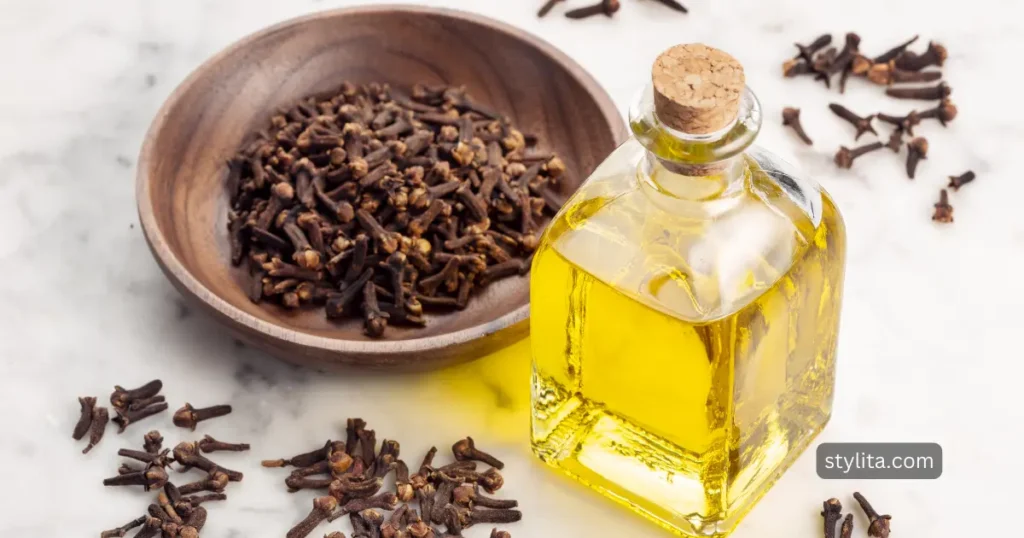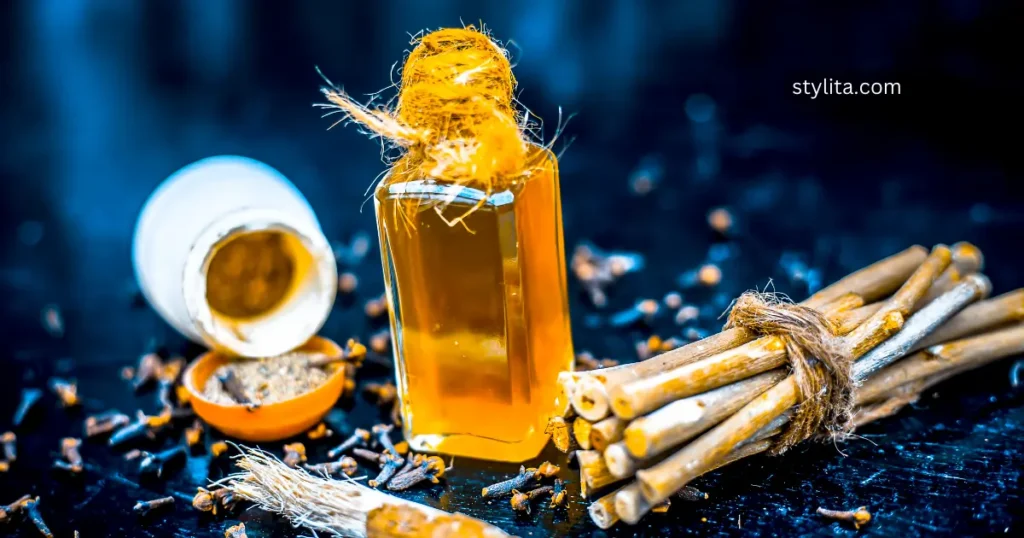Introduction
Picture ancient civilizations harnessing the aromatic allure and potential benefits of cloves for their hair. Join us in this captivating exploration of the mystical world of clove water and its enchanting effects on our tresses.
1. Understanding Clove Water
1.1 The Essence of Clove Water
Clove water, derived from the Syzygium aromaticum plant, contains eugenol, a strong chemical known for its antibacterial properties. This fragrance infusion has easily mixed into traditional and holistic hair care, adding allure to its scientific benefits.
1.2 Historical and Cultural Significance in Hair Care
Through the annals of history, diverse cultures have embraced clove water for its therapeutic benefits in hair care. From ancient civilizations to modern practices, the rich cultural tapestry of clove water adds depth to its usage, extending beyond its scientific properties.
2. Benefits of Clove Water for Hair

2.1 Harnessing Antimicrobial Properties
Embark on a scientific journey as we unravel the methodologies and specific findings behind eugenol’s prowess in maintaining a healthy scalp environment. Clove water, with its eugenol content, transcends the surface, combatting bacteria and fungi for overall hair health.
2.2 Invigorating Hair Growth
Explore the intricate biological processes involved in the stimulation of hair growth by clove water. From improved blood circulation to the complex mechanisms within hair follicles, this detailed examination provides a holistic understanding of how clove water contributes to stronger, thicker hair growth.
2.3 Exploring Additional Positive Effects
Explore additional positive effects with a diverse range of DIY clove water recipes, each tailored to address specific hair concerns. These step-by-step guides, enriched with detailed explanations, empower users to customize their hair care routine.
DIY Clove Water Recipes:
- Clove Water Infusion for Lustrous Shine
- Step 1: Gather fresh cloves and distilled water.
- Step 2: Boil the water and add cloves.
- Step 3: Allow it to cool, strain, and use as a final hair rinse after shampooing.
- Clove Water Hair Mask for Dandruff Control
- Step 1: Combine cloves, yogurt, and honey.
- Step 2: Apply the mask to damp hair.
- Step 3: Rinse after 30 minutes for nourished and dandruff-free hair.
3. Methods of Applying Clove Water

3.1 Crafting DIY Clove Water
Crafting your own clove water at home is a simple and cost-effective way to incorporate this natural remedy into your hair care routine. From basic infusions to more complex hair masks, numerous DIY recipes cater to different hair types and concerns.
DIY Clove Water Recipes:
- Clove-Infused Hair Rinse for Radiance and Vitality
- Step 1: Boil water and add a handful of cloves.
- Step 2: Allow the mixture to cool and strain.
- Step 3: Use the clove-infused water as a final hair rinse after shampooing.
- Clove Water Hair Mask for Intensive Conditioning
- Step 1: Mix clove water with honey and coconut oil.
- Step 2: Apply the mask to damp hair and leave it for 30 minutes.
- Step 3: Rinse thoroughly for nourished and hydrated hair.
3.2 Application Techniques
Master the art of applying clove water to your hair to maximize its benefits while minimizing potential side effects. Whether through gentle massages, targeted scalp treatments, or rinses, understanding various application techniques ensures optimal absorption and efficacy of clove water.
Application Techniques:
- Gentle Scalp Massage with Clove Water
- Use your fingertips to massage clove water into your scalp in circular motions.
- This technique promotes blood circulation and even distribution of clove water.
- Targeted Scalp Treatment
- Apply diluted clove water directly to areas with specific concerns, such as dandruff or itchiness.
- This targeted approach addresses specific issues without affecting the entire scalp.
- Clove Water Rinse
- After shampooing, use diluted clove water as a final rinse to leave a subtle fragrance and promote overall hair health.
4. Potential Side Effects

4.1 Be aware of allergic reactions
Clove water, despite its apparent benefits, can induce allergic reactions in some people. Scalp discomfort, redness, and edema are all possible symptoms. To avoid additional discomfort, a patch test must be performed before to full-scale injection to detect any adverse effects.
4.2 Sensitivity and Irritation
In some individuals, direct contact with clove water may cause scalp irritation or sensitivity, especially those who have prior skin issues or sensitivities. Understanding the signals of pain and adjusting the frequency or concentration of clove water application might help reduce any negative responses.
4.3 Caution Against Overuse
Overuse of clove water, like many natural therapies, could end up in unforeseen consequences such as scalp dryness or brittle hair. Moderation and close monitoring of hair and scalp health are needed to avoid overuse and maintain a balanced hair care routine.
5. Research and Scientific Studies
5.1 Exploring Studies on Clove Water and Hair
Scientific study on the benefits of clove water on hair is continuing to grow, providing useful insights into its efficacy and safety. Exploring the techniques and findings of these studies might help customers make more informed decisions about using clove water in their hair care routines.
5.2 Seeking Expert Opinions
Gaining perspectives from hair care experts and professionals offers valuable guidance on integrating clove water into a comprehensive hair care routine. Expert opinions provide practical tips, dosage recommendations, and insights into potential interactions with other hair care products.
6. User Experiences and Testimonials
6.1 Celebrating Positive Experiences
Real-life testimonials and anecdotes from users highlight the transformative potential of clove water on hair health. Positive experiences often emphasize improvements in hair texture, shine, and overall scalp condition, offering inspiration to those considering incorporating clove water into their regimen.
Positive Experiences:
- Lustrous and Revitalized Hair
- Users commonly report enhanced shine and revitalization, attributing these effects to regular use of clove water.
- The aromatic infusion is praised for its ability to leave hair looking and feeling healthier.
- Balanced Scalp Condition
- Positive testimonials frequently mention a reduction in dandruff and improved scalp health with consistent use.
- Users celebrate the balancing effect of clove water on their scalp’s microbial environment.
6.2 Acknowledging Negative Experiences
Balancing the narrative, negative experiences shed light on potential drawbacks and challenges associated with using clove water on hair. Honest accounts of adverse reactions or unsatisfactory results provide a holistic perspective for readers weighing the pros and cons of clove water usage.
Negative Experiences:
- Scalp Irritation and Allergic Reactions
- Some users report scalp irritation, itching, or allergic reactions, underlining the importance of patch testing.
- These experiences highlight the need for cautious and personalized usage.
- Varied Results in Some Cases
- Negative testimonials occasionally cite varied results, such as no noticeable improvement in hair texture or appearance.
- It’s essential to acknowledge that individual responses to clove water may vary.
7. Precautions and Safety Measures
7.1 Prioritizing Patch Testing
A patch test before conducting clove water to the entire scalp is a vital safety precaution. This easy procedure helps identify allergic reactions or sensitivities, allowing users to alter their dosage and reduce the chance of adverse reactions.
Patch Testing Process:
- Choose a Small place: Locate a small, inconspicuous place on your forearm or behind your ears.
- Apply Diluted Clove Water: Dab a tiny amount of diluted clove water over the desired location.
- Observe for 24 hours: Check for signs of inflammation, redness, or itching.
- Proceed with Caution: If no adverse reactions occur, you may explore a broader application, but always exercise caution.
7.2 Emphasizing Dilution Guidelines
Understanding the importance of proper dilution when using clove water is essential to prevent potential irritation or scalp sensitivity. Following dilution recommendations based on hair type and sensitivity levels ensures a safe and effective application of clove water.
Dilution Guidelines:
- For Sensitive Scalps: Dilute clove water with more water, especially if you’re dealing with sensitive skin or a history of scalp issues.
- Balancing strength: Find a balance that works best for your scalp, taking into factors like hair type and overall scalp health.
7.3 Navigating Frequency of Use
Finding the optimal frequency of using clove water depends on individual hair needs and tolerances. Monitoring scalp and hair health and adjusting the frequency of use accordingly helps maintain a balanced and sustainable hair care routine.
Frequency Considerations:
- Start Slow: Begin with a lower frequency, gradually increasing based on your hair’s response.
- Listen to Your Scalp: Pay attention to any signs of sensitivity or overuse, adjusting accordingly.
8. Alternatives to Clove Water
8.1 Exploring Diverse Natural Remedies
Discover alternative natural remedies that offer similar benefits to clove water for hair care. From essential oils to herbal infusions, a variety of options cater to diverse hair types and preferences, providing alternatives for those seeking different approaches to hair care.
Natural Alternatives:
- Tea Tree Oil: Tea tree oil, renowned for its antibacterial characteristics, can be diluted and massaged into the scalp to support scalp health.
- Rosemary Infusion: Instead of clove water, consider using a rosemary-infused rinse to boost hair growth.
8.2 Considering Commercial Hair Care Products
For those preferring convenience, commercial hair care products incorporating clove extracts offer a convenient alternative to DIY preparations. Comparing these products with homemade solutions helps users make informed choices based on their preferences and lifestyle.
Commercial Products:
- Clove-Infused Shampoos: Many brands sell shampoos soaked with clove extracts, making them a convenient option for those looking for the benefits of clove water.
- Conditioners with Clove Extracts: Enhance your routine with conditioners supplemented with clove extracts for an effortless addition of this healthy component.
9. Conclusion
9.1 Summarizing Key Findings
In summary, clove water is a potential natural therapy for improving hair health and vitality. Its antibacterial characteristics, ability to stimulate hair growth, and other advantages make it an excellent addition to holistic hair care routines.
9.2 Personalizing Your Approach
Individual factors such as hair type, sensitivity, and personal preferences all play an important role in establishing the usefulness of clove water for hair care. Consulting with professionals and completing thorough research can assist users in making informed decisions that are tailored to their specific needs.
10. References
10.1 Citing Scientific Studies
Ensure transparency and credibility by citing relevant scientific studies that contribute to the understanding of clove water’s effects on hair.
10.2 Recognizing Trusted Sources and Experts
Acknowledge and cite experts and trusted sources that have contributed valuable insights and information to the article.
Congratulations! You have finally completed this comprehensive reference about the effects of clove water on hair. Make informed judgments based on your hair needs and preferences, whether you create your own DIY recipes, experiment with alternative therapies, or use commercial solutions. I wish you a wonderful and fulfilling hair care journey!



